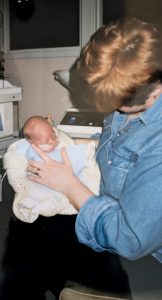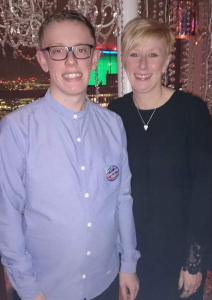
‘Listen to us as parents’: study highlights parents’ overlooked role in paediatric medication safety in English hospitals
This year’s World Patient Safety Day, observed on 17 September (Wednesday), brings attention to the critical need to strengthen safety for children and newborns in healthcare. With the theme Safe care for every newborn and every child, the World Health Organization (WHO) is urging immediate action to prevent avoidable harm in paediatric and neonatal care.
In response, the National Institute for Health and Care Research (NIHR) Greater Manchester Patient Safety Research Collaboration (GM PSRC) released a powerful podcast episode that explores the overlooked role of parents on ensuring safe medication practices for children in hospital care.
This special Voices for Safety episode, launched on 17 Sept across all streaming platforms, draws on findings from an NIHR-funded study and the lived experiences of Heidi Ridgewell, a mother and advocate whose son was harmed by a preventable medication error. The study They Take the Mum Off You When You Come In, which Heidi’s story helped to shape, highlights that parents are routinely excluded from hospital medication safety systems, despite playing a critical role in safeguarding their children’s care.
Conducted at the University of Manchester with the support of the NIHR GM PSRC, the research reveals that systemic assumptions about parental incompetence contribute to communication breakdowns, missed opportunities for collaboration, and a form of epistemic injustice that undermines both paediatric safety and trust.
Dr Adam Sutherland, the lead researcher featured in the podcast, Associate Professor in Healthcare Quality and Safety and NIHR PSRC Research Fellow, said:
“This ethnographic study set out to explore how hospitals maintained the safety of children in their care when prescribing, preparing and administering medicines. We found that parents were an important part of this process but were not acknowledged officially by the healthcare system. Parents wanted to help care for their children in hospital but were sometimes prevented from doing so, and then effectively had to watch while the hospital got it wrong.
Parents want healthcare professionals to listen to them, to understand that their lived experience is more important than medical notes that are often out of date, and to understand that their home routines are not ‘medication errors’ or ‘procedural violations’ but natural and effective adaptations to incorporate medicines into daily family living.”
In the episode, hosted by Dr Louise Gorman, Public and Community Involvement and Engagement manager at the NIHR GM PSRC, Heidi shares how her son’s preventable medication harm and years spent navigating complex hospital care inspired her to speak up, collaborate with researchers, and help other families find their voice in the healthcare system. Reflecting on her experience of engaging with Adam’s study, she says:
“From the very first conversation with Adam, I realised: you’re allowed to have a voice. You’re allowed to speak about this. You can say what was wrong and that things can be better”
Heidi is now a Family Support Worker for Ryedale Special Families, a Charity based on North Yorkshire supporting families of children with additional needs. Drawing on her own experience, she advocates:
“Listen to us as parents. We live, breathe, eat, sleep—and then repeat—all of this medical information day in, day out. Our children’s needs are constantly being put before ours. And we know our children”.
You can listen to the episode on YouTube, Spotify, Amazon Music or Apple Podcast.
World Patient Safety Day podcast episodes
Voices for Safety is a patient safety podcast produced by the NIHR GM PSRC. Launched on World Patient Safety 2024, the show delves into key topics in patient safety research, ranging from medication safety and safety culture, to designing safer health and care systems and preventing suicide and self-harm.
To Mark World Patient Safety Day 2025, two special episodes will be released:
- Episode 1: The Hidden Role of Parents in Paediatric Medication Safety
- Episode 2: Patient Safety from the Start: Caring for Pre-Term Babies
Both episodes feature NIHR-funded research, offering powerful insights into improving care for children and newborns.
Notes to editors:
Adam Sutherland and Heidi Ridgewell are available for interviews on request.
For more information, please contact the NIHR GM PSRC External Communications Manager, Melissa Lima: melissa.limasilva@manchester.ac.uk
About the NIHR Greater Manchester PSRC
The NIHR Greater Manchester Patient Safety Research Collaboration (GM PSRC) aims to make health and care systems safer, especially for individuals, families, and communities with the greatest need for improvement.
We do this through carrying out innovative research in partnership with patients, staff, and those in contact with health and social care, so their lived experiences are at the very core of our research. We believe this will lead to better outcomes for individuals while improving the ability of health and social care staff to deliver safer care.
There are 6 PSRCs located across England.
About the NIHR
The mission of the National Institute for Health and Care Research (NIHR) is to improve the health and wealth of the nation through research. We do this by:
- Funding high quality, timely research that benefits the NHS, public health and social care;
- Investing in world-class expertise, facilities and a skilled delivery workforce to translate discoveries into improved treatments and services;
- Partnering with patients, service users, carers and communities, improving the relevance, quality and impact of our research;
- Attracting, training and supporting the best researchers to tackle complex health and social care challenges;
- Collaborating with other public funders, charities and industry to help shape a cohesive and globally competitive research system;
- Funding applied global health research and training to meet the needs of the poorest people in low and middle income countries.
NIHR is funded by the Department of Health and Social Care. Its work in low and middle income countries is principally funded through UK international development funding from the UK government.
The views expressed are those of the author(s) and not necessarily those of the NIHR or the Department of Health and Social Care.









0 Comments